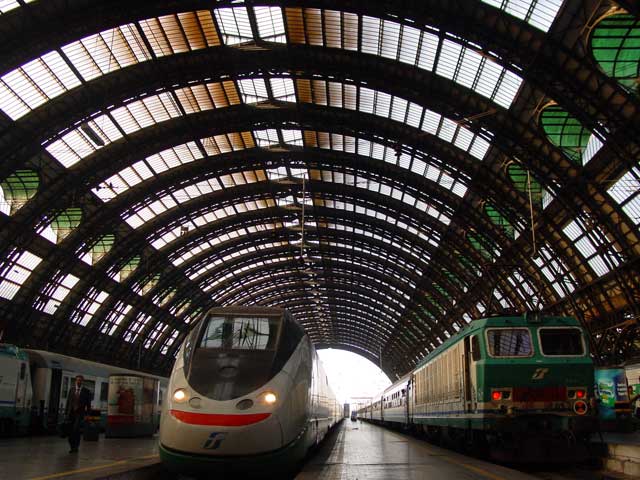Simon Calder: Has Europe's rail revolution hit the buffers?

This is the age, we are frequently reminded, of the train. Across Europe, the story goes, the railways are set to eclipse the airways. The airport experience is ever more wretched, and three months tomorrow the Chancellor helps himself to an extra £1 for every Europe-bound flyer. In contrast, the prospects for trains to lure passengers from aircraft have never looked brighter.
The FIGS (France, Italy, Germany and Spain – the nations that are serious about high-speed rail) continue to extend their fast lines, and in northern Sweden the opening this month of a crucial, 50-mile stretch of the Botniabanan north to Umea accelerates the approach to the Arctic aboard the most civilised form of transport.
The train epitomises the acceptable face of transportation. While building lines devours land, materials and energy, once constructed railways are gentle on the environment. Aesthetically, broad windows divulge the secrets of countryside, coast and city.
I fear, though, that the rail revolution is heading for the sidings, if not the buffers. Among the many wonderful features of railways is the ease with which services can be culled by any Finance Minister with an urgent need to trim spending. Last Sunday I waited at a level crossing on the single-track line between the Dutch towns of Enkhuisen and Hoorn. A splendid ensemble, the colour of Edam cheese, spun past – a locomotive hauling four double-deck coaches, capable of seating perhaps 500 people. There appeared to be three passengers on board.
Now, I am the first to support the principle that you need to provide plenty of capacity in order to entice people out of their cars and on to public transport, and to accept the possibility that a couple of hundred travellers were waiting at the next station down the line. But when the passengers on a Jumbo-sized train would fit comfortably into a taxi, you can understand why politicians may question the value of the subsidies that many railways, and we passengers, enjoy.
According to the August edition of the Thomas Cook European Rail Timetable, the axe is already falling. As usual this summer, Inter-Railers are turning some of the Continent's long-distance trains into mobile dormitories; you might imagine that every spare bit of rolling stock would be pressed into service. But the new schedule tells of retrenchment from Ireland (where the link between the port of Rosslare and Waterford is under threat) to the Tatras ("no services over the cross-border route between Poland and Slovakia this summer").
As austerity measures take effect in Greece, several routes from Thessaloniki have "fallen victim to the country's financial crisis". And the winter is set to be even gloomier: heavens, the ever-popular sleeping car from Warsaw via Minsk in Belarus to the Kazakh capital, Astana, "now runs only in the summer".
The summer edition of the splendid Hidden Europe magazine reveals the scale of retrenchment in just one city: Trieste. "As recently as 1997, Trieste was served by the daily Simplon Express from Geneva to Zagreb and by the regular Venice to Budapest services.
One by one, services across the Italian-Slovene border have been axed to the extent that the Venezia Express is now the sole remaining service across that frontier. The train creeps by dead of night across the karst on the northern fringes of the city, pausing at the railway station at Villa Opicina. As the magazine points out, Trieste is the city described by Jan Morris as "the natural capital of the nation of nowhere". Now it appears to be on the railroad to nowhere.
Italian trains cut out competition
"Trenitalia is busy trying to cut itself off from the rest of Europe": that is the view of the rail guru, Mark Smith, who founded the Seat61.com website to improve life for terrestrial travellers. He blames the Italian state railway for Trieste's detachment from Slovenia and much else.
The train operator's recent acts include "terminating Milan-Nice trains at the French border, and withdrawing the Rome-Switzerland and Rome-Nice sleeper trains".
The European Union has brought in "open access" on international routes to parallel "open skies" in aviation. The plan is to encourage competition, expand services and reduce fares. However, "Trenitalia has scuppered German and Austrian EuroCity trains on the Munich-Innsbruck-Verona-Milan route by booking the best train paths even though they have no intention of using them, just to spite the 'competition'."
Join our commenting forum
Join thought-provoking conversations, follow other Independent readers and see their replies
Comments
Bookmark popover
Removed from bookmarks